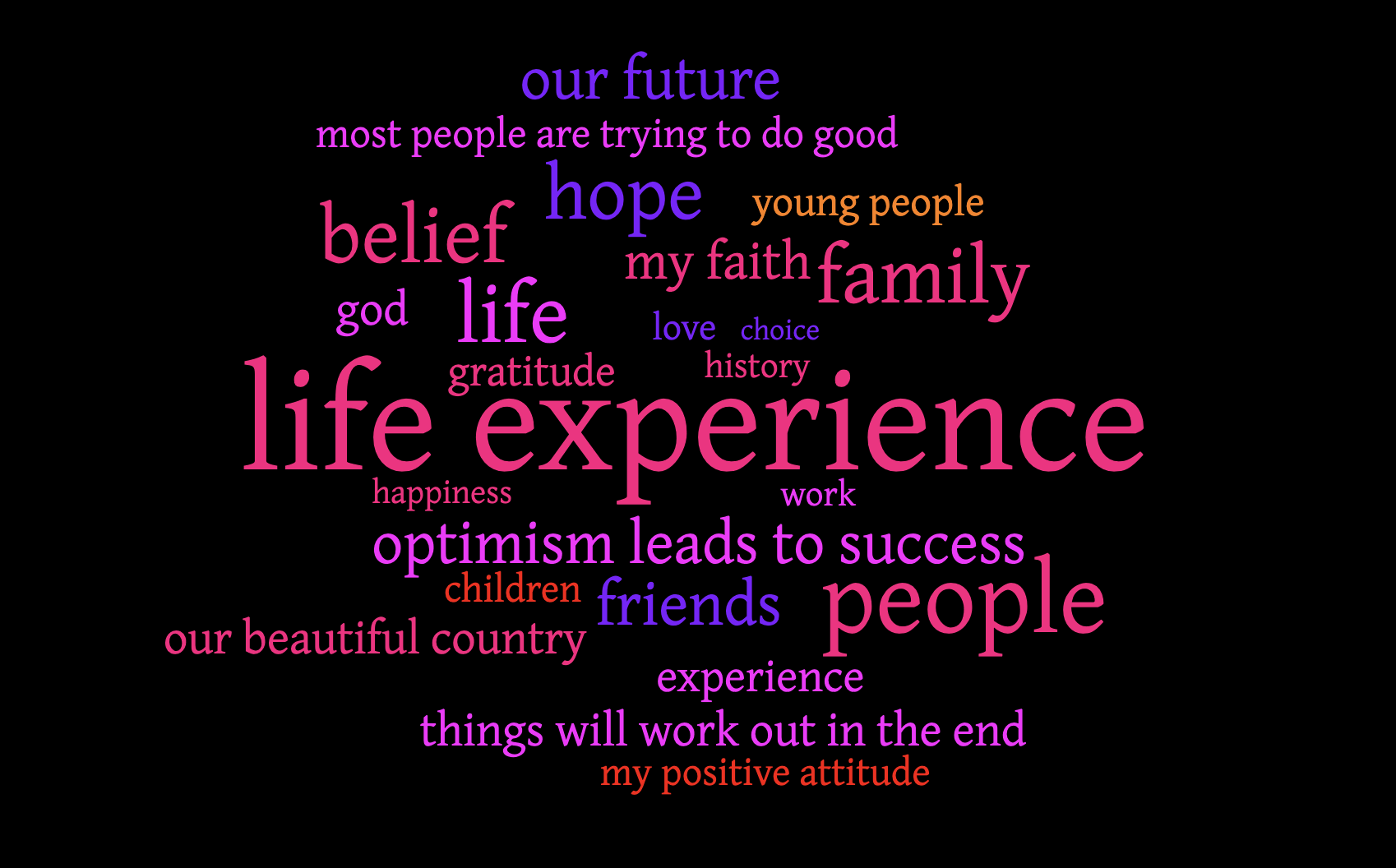The first global survey by The Centre for Optimism has found government, the economy, business conditions and consumer confidence are all missing in action as sources of optimism.
More than 500 respondents from 26 countries cited life experience, mindset, family, friends, faith, gratitude and young people as their main sources of optimism.

The Centre for Optimism’s first on-line survey asking the open question “What makes you optimistic?” was completed in February and received responses from 26 countries.
The definition offered to survey participants was “Optimism is an expectation that good things will happen and that things will work out in the end.”
COO of The Centre for Optimism, Victor Perton, said: “The results are in line with contemporary academic and medical research on what makes people optimistic.”
He said life experience provided people with the wisdom to put the ordinary anxieties of life in context. Surrounding yourself with positive relationships family, friends and young people helps build optimism.
“Gratitude is a powerful underpinning of optimism as is faith,” he added.
“Asking yourself and your friends ‘what makes you optimistic?’ is a good start. Surrounding yourself with positive people is a key to success.
Meghan, Duchess of Sussex says ”it’s so important to surround yourself with people who are grounded and really optimistic.”
Gratitude exercises, meditation and spirituality are powerful underpinnings.
“Recently published research from Harvard, Mayo Clinic and others show optimism is a key to healthy longevity and mental health.”
Chairman of the Centre, Robert Masters, said the results of the survey throw out a clear challenge to government and business.
“Most surveys ask specific questions about confidence in government and the economy. Yet when people are asked what makes them optimistic, government and business don’t feature in the results,” he said.
“In public life, there’s a prevailing pessimism and cynicism that’s turning many people, especially young people, away from democratic institutions and systems.
“People have an expectation of realistic and infectiously optimistic leadership. They are yearning for that direction and confidence in the future that provides them with hope and optimism.
“They are currently being ‘drowned with negatives views and thoughts and this is being abetted by social media. The challenge to our political and business leaders is to provide confidence and hope from their leadership.
“Unfortunately, the ‘He said, She said’ Punch and Judy show of modern politics provides little space for our contemporary leaders to shine as optimistic leaders and inspire. Their language is often seen as negative and demeaning. This needs to be turned around.”
Background: The Centre for Optimism was established in 2019, headquartered in Melbourne with an international advisory board. It asks people “what makes you Optimistic.” In its workshops and roundtables, it helps organisations foster realistic and infectiously optimistic leadership.
In 2019, The Centre for Optimism interviewed over 4000 people around the world, from heads of state to people digging ditches in India asking the same question: “What makes you optimistic?” Their comments are published on its website www.centreforoptimism, on social media and in publications.
Appendix: Typical February Survey Answers to the Question “What makes you Optimistic?
“The joy of connecting with people and striving to live a meaningful life”
“Life seems to run smoother when you have a positive outlook even in the worst circumstances”
“Life has shown me that in the depths of the dark, you can choose to put a light on, that ability to go on, to push through and make it”
“Life is good even with hiccups along the way”
“I am a research scientist. I constantly believe that what I try to do every day has the potential to improve our world. Optimism is fundamental to my everyday activities.”
“The magic of life helps me be optimistic, so flowers and trees and gardens and butterflies and bees, growing and nourishing and thriving help me.”
“The certainty that human ingenuity will thrive best in an optimistic environment in which people can be their best self.”
“52 years of evidence that if I have a positive attitude and good work ethic, things will turn out well for me.”
“Both optimism and pessimism are self-fulfilling prophecies. I choose optimism not out of naivety, but for the way it marshals forces that help the outcomes I seek.”
“Experience that everything turns out OK in the end. If it isn’t OK it isn’t the end”
“Long term experience tells me plus I believe ‘what you put out there, is what you get back’.”
“I have an amazing family and friends and have everything I need for the good times and the bad times. I know if I work hard at my goals and am kind and respectful that my future will always be good.”
“I see many positive things happening every day at a community and individual level and it reminds me that the good people outweigh the disruptive ones.”
Countries represented in the survey include Argentina, Australia, Austria, Bangladesh, Brazil (Brasil), Cambodia, Chile, Colombia, Denmark, England, France, Germany, Ghana, India, Ireland, Italy, Lithuania, Netherlands, New Zealand, Nigeria, Philippines, Scotland, Singapore, South Africa, Switzerland, Thailand, The United Kingdom, USA, Uzbekistan.


